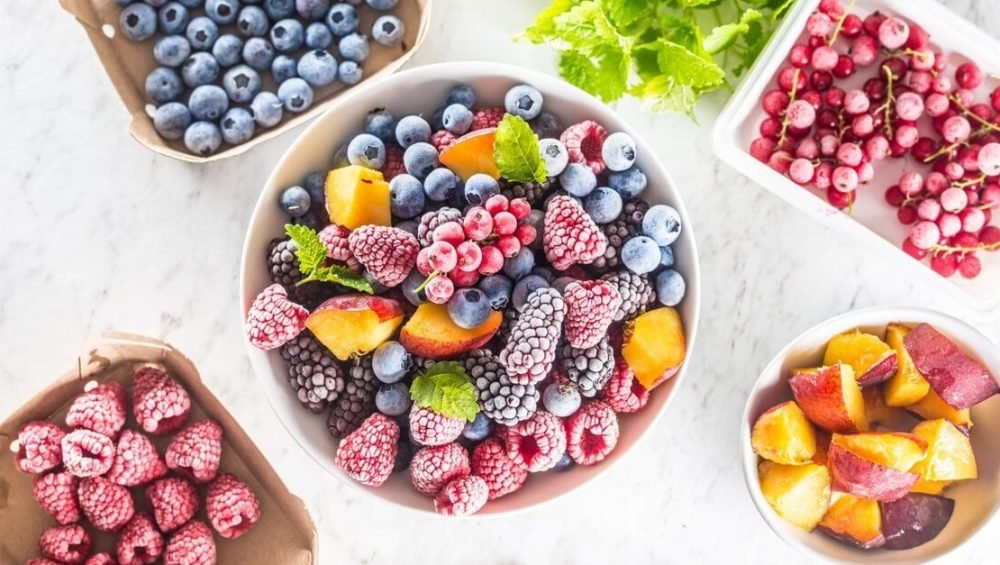Foods are preserved using physical, chemical, and biological storage methods to prevent spoilage and enable long-term storage. Among these, freezing food is one of the safest methods. However, the freezing process varies depending on the type of food and its characteristics. So, is frozen fruit healthy? This is a question of interest for many. In this context, we explore the method of freezing fruits and its impacts. It’s crucial to assess which fruits can be frozen and how they are used. Does the freezing method ensure that frozen fruits retain their vitamins and minerals? We delve into the details of frozen fruits.
Benefits of Fresh and Frozen Fruits
Incorporating fresh and frozen fruits into your diet can be highly beneficial, as each type offers distinct advantages. Understanding these benefits can help you make informed choices that align with your nutritional needs and lifestyle preferences:
- Nutrient Preservation: Fresh fruits are rich in vitamins and minerals, especially when consumed soon after harvest. However, the nutrient content can decrease during transportation and storage. Frozen ones are typically picked and frozen at peak ripeness, removing most nutrients. This makes them a reliable source of vitamins and minerals, even out of season.
- Antioxidant Availability: Fresh fruits are excellent sources of antioxidants, but these levels can diminish over time. Due to the freezing process, frozen ones often retain high levels of antioxidants, making them a beneficial choice for combating oxidative stress and inflammation.
- Dietary Fiber: Both fresh and frozen foods are good sources of dietary fiber, which is essential for digestive health. The freezing process does not significantly affect the fiber content, ensuring frozen fruits provide similar digestive health benefits to their fresh counterparts.
- Low in Calories: Fruits, whether fresh or frozen, are low in calories and water content, making them a healthy choice for weight management and hydration.
- Reduced Pesticide Exposure: Freezing can reduce the residue of some pesticides used in fruit farming. Frozen ones offer a slightly safer option for those concerned about pesticide exposure, though washing fresh fruits also helps reduce this risk.
- Year-Round Nutritional Consistency: The nutritional content of fresh fruits can vary based on season and ripeness at the time of purchase. The other one offers more consistent nutrient levels throughout the year.
- Convenience and Reduced Waste: Frozen fruits are convenient, leading to better dietary adherence. They also reduce food waste, as you can use only what you need and store the rest.
By understanding these differences, you can make informed choices based on your dietary needs, cooking preferences, and lifestyle. Both fresh and frozen are excellent choices for maintaining a healthy and balanced diet.
Food Storage Methods
The most effective way to eat healthily is to consume vegetables and fruits in season. However, it is necessary to preserve excess food using appropriate storage methods to prevent food waste. In this respect, the research “What are the methods of storing nutrients?” raises many alternatives to the question.
Storage by Applying Heat Treatment
Storage methods by applying heat treatment differ according to the food spread. It is essential to apply heat to the pH level. Pasteurization is used for foods with a pH below 4.5. Fruits such as lemon and cherry and vegetables with high acid content are examples of this.
The sterilisation process is suitable for foods with a pH above 4.5. It can be applied to meat, milk, and some vegetables. Making foods durable by being subjected to heat in a tin or jar is called canning.
Drying Storage
Drying, which evaporates the water in the food, is one of the most traditional food storage methods. It can be done in two ways: sun-drying and artificial drying. Sun drying, one of the classical drying methods, can be risky in terms of both the required large area and hygiene. However, dehydration and freeze-drying are the most preferred frozen fruit storage methods.
Storage by Fermenting
It is a storage method provided with acids obtained from beneficial microorganisms. It is preferred to store food for a long time and make it delicious. Foods such as meat and pickles are suitable for storage by fermenting.
Smoke Storage
The smoking process used for meat and fish is based on withdrawing some water from the food. The smoke obtained by burning sawdust from hard and fragrant trees such as laurel, hornbeam, and oak is used in incense. It contributes greatly to making the food delicious.
Storage with Chemicals and Spices
Spices and chemicals are used to prevent the growth of microorganisms. Salt and sugar are among the natural chemicals used. Products such as vinegar, organic fruit acids and nitrite fall into the group of artificial substances. The use of some of these synthetic chemicals in the food industry is limited. Excessive use of these products is not recommended.
Vacuum Storage
The vacuum method stands for packaging foods with or without processing and their storage by vacuuming the air. This storage method reduces the volume of food. It prevents spoilage by stopping the activities of microorganisms and enzymes in food.
Freeze Storage
Fruits and vegetables are foods that contain a lot of water. Therefore, creating a moist environment that allows the proliferation of microorganisms and the deterioration of nutrients is easier. Freezing food prevents the growth of these microorganisms. There are stages of freezing in foods. It forms the stages of separating, cleaning, chopping, freezing for vegetables, and adding sugar, if necessary, for fruits. When it comes to whether frozen fruit is healthy, it should be noted that great care should be taken while consuming frozen products.
Advantages and Disadvantages of the Freeze Storage Method
When discussing frozen fruit, it’s essential to understand the concept of freezing, which involves preserving foods at -40 degrees and storing them at -18 degrees. This method is widely applied to various foods, including fruits, and has gained global popularity in production and consumption. A critical aspect of freezing fruit is tailoring the freezing speed to suit the specific type of fruit. So, what are the advantages and disadvantages of using the freeze-storage method for fruits?
- The shelf life of frozen foods increases.
- It makes vegetables and fruits available in all seasons.
- Foods frozen without the use of additives do not lose their flavour. To ensure the frozen fruit is healthy, whether additives are used in the freezing process should be checked.
- It saves time and labor due to its practical use.
- Frozen products can prevent the waste of resources in the country’s economy. Especially if the cold chain is successful, the advantage of the freezing method becomes more apparent.
Although the freezing method is a frequently used and safe storage method, it has some disadvantages. Here are the elements that those who want to use the cool method should pay attention to:
- The product must be thawed in suitable conditions and consumed without waiting long. During the exposure of frozen products to heat, harmful microorganisms and bacteria may multiply.
- Cold chains should be used to transport frozen food.
- The thawed product should not be re-frozen.
Fruits Suitable for Freezing and Where They Are Used
Determining which foods are suitable for freezing when freezing foods is important. Consideration should be given to whether frozen fruit is healthy or not. Fruits such as strawberries, cherries, apples, raspberries, tangerines, apricots and peaches are suitable for freezing. These fruits are consumed quite a lot among products marketed as frozen.
Those who wonder if frozen fruit is healthy can see many places where this fruit is used. You can use frozen fruit in pastries, cake making, juice or compote. However, it is important to consume it without waiting too long.
Freeze-drying comes to the fore among food storage methods, where you can store food without losing its taste, smell, or nutritional value. Freeze drying, also known as the Freeze Dry method, is advantageous among other storage methods. Especially if you are considering whether frozen fruit is healthy, you can safely try the freeze-drying method.
Differences Between Freeze Method and Freeze Drying
As the healthiest method to extend the shelf life of foods and consume them healthily, freeze-drying is highly preferred. Because the freeze-dry method is the most advanced drying method in today’s conditions. You can safely and healthily store your food.
In the freezing method, storing foods by freezing them directly at -40 degrees is possible. While some fruits are suitable for freezing, spoiling quickly or losing their properties during thawing is risky. In freeze-drying technology, on the other hand, the water is transformed from solid-state ice to gaseous water vapour without going back to liquid state.
So the sublimation principle is used. In this respect, whether frozen fruit is healthy is very important for those wondering about the freeze-dry method. You can safely store the vegetables and fruits you buy from your garden with the freeze-dry method.
When you use the freeze-drying method with the Liyolife freeze dryer, the fruits never lose their colour, smell, taste, and nutritional value. Provides long-term storage. Thus, it greatly contributes to the home economy and the national economy. Moreover, you can continue to store your products at room temperature after freeze-drying. With the freeze dryer, keeping seasonal fruits in the comfort of your home becomes easier.
You can reach our previous article from https://liyolife.com/en/what-is-the-freeze-drying-method/







